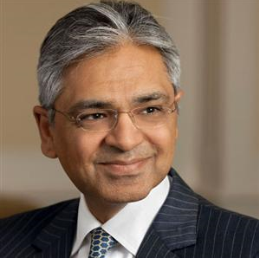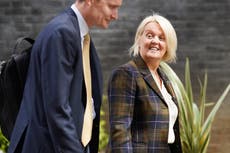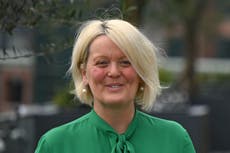Nigel Farage banking scandal claims another scalp as Coutts CEO quits
Peter Flavel is second bank chief to resign over cancellation of ex-Ukip leader's account, as pressure mounts on NatWest chair to go next
Your support helps us to tell the story
From reproductive rights to climate change to Big Tech, The Independent is on the ground when the story is developing. Whether it's investigating the financials of Elon Musk's pro-Trump PAC or producing our latest documentary, 'The A Word', which shines a light on the American women fighting for reproductive rights, we know how important it is to parse out the facts from the messaging.
At such a critical moment in US history, we need reporters on the ground. Your donation allows us to keep sending journalists to speak to both sides of the story.
The Independent is trusted by Americans across the entire political spectrum. And unlike many other quality news outlets, we choose not to lock Americans out of our reporting and analysis with paywalls. We believe quality journalism should be available to everyone, paid for by those who can afford it.
Your support makes all the difference.The head of the upmarket private bank Coutts has become the second banking chief in two days to resign over the closure of Nigel Farage’s accounts.
Peter Flavel acknowledged that the handling of the case “fell below Coutts’s high standards” and stepped down with immediate effect on Thursday.
His departure piles pressure on Sir Howard Davies, the chair of NatWest Group – which is 39 per cent owned by the taxpayer and is the parent company of Coutts – to stand down. It follows the resignation of Dame Alison Rose as the chief executive of NatWest, after a debacle which has plunged the banking group into chaos.
Sir Howard initially expressed “full confidence” in Dame Alison when she admitted she was the source of a leak to a BBC journalist, which led to a misleading story suggesting Mr Farage’s accounts were shuttered solely for financial reasons.
Mr Farage, the former leader of the pro-Brexit Ukip party, later obtained internal documents labelling him as “xenophobic and racist” and a “grifter”, suggesting his accounts were closed in part due to his political views.
During the continued fallout from the row between Mr Farage and the bank, Rishi Sunak declined to say whether he had confidence in Sir Howard.
When asked, the prime minister said it “wasn’t right for people to be deprived of basic services like banking because of their [political] views”.
Responding to Mr Flavel’s resignation, Mr Farage said it was “only a matter of time”. “The ultimate responsibility for the dossier de-banking me for my political views lies with him.”
He added: “I even wrote to Mr Flavel twice before going public and didn’t receive an acknowledgment.”
Senior Tory MP David Davis welcomed the resignation as the “honourable thing to do”, but said Dame Alison and Mr Flavel had left “quite a large dent” in NatWest’s reputation.
“If I was considering a new bank I would not go to this group,” he told The Independent.
Mr Davis said the only thing left to do is a “reasonably rapid” replacement of NatWest chair Sir Howard.
“I don’t think he should tender his resignation tomorrow… but in a month or two,” Mr Davis said.
And he said that Dame Alison and Mr Flavel should not receive payouts for quitting before their contracts expired. He added: “If a bank clerk had breached confidentiality or done the sorts of things we are talking about here, then they would have been out on their ear, and there would not have been a compensation payment
“It would send entirely the wrong message to their customers and their shareholders – including taxpayers – if they paid-off either Alison Rose or Mr Flavel.
“If we see enormous compensation for loss of office, that would be very wrong indeed.”
It comes as NatWest prepares to unveil its half-year financial results on Friday. The bank, whose largest owner is the Treasury, is expected to reveal an operating pre-tax profit of £3.3bn for the latest half year, up from £2.6bn in the same period last year.
In a statement on Thursday afternoon, Mr Flavel said he was “exceptionally proud” of his seven-year tenure at the bank.
But he added: “In the handling of Mr Farage’s case we have fallen below the bank’s high standards of personal service.
“As chief executive of Coutts it is right that I bear ultimate responsibility for this, which is why I am stepping down.”
Acting NatWest chief executive Paul Thwaite, who took the reins after Dame Alison’s departure, said he was “personally sorry to lose Peter as a colleague”.
But Mr Thwaite said his departure was “the right decision for Coutts and the wider group”.

Mohammad Kamal Syed, who joined in 2012 and is currently Coutts’s head of asset management, will take the top job at the private bank while a replacement is found. Mr Thwaite said he would be the “ideal person” for the role.
Australian-born Mr Flavel, 63, had been chief executive of Coutts since 2016 when he became the first non-British boss in more than 300 years of the bank’s history.
His salary is not publicly disclosed but it is thought to be around £910,000 and outside Coutts he is vice-chair of trustees of the Duke of Edinburgh Commonwealth Study Conference and a member of the philanthropy advisory committee of the Royal Albert Hall.
Mr Flavel has more than 30 years of experience in financial services across Asia, Europe, the Americas, the Middle East and Africa.
Before joining Coutts, he was the CEO of JP Morgan Private Wealth Management in Asia Pacific based in Singapore. He also spent nine years with Standard Chartered in Asia and founded their global private bank in 2006.
The CEO has been credited for a boost in Coutt’s performance since he joined. “Peter’s passion for innovation across banking, lending and wealth management and raising the bar on service standards has led to a market-leading net promoter score from Coutts’ clients,” his NatWest Group profile says.
“He has revived Coutts’ branding and image to be more warm and modern, whilst taking pride in its history, encouraging clients to recognise that Coutts is ‘more than a bank’.”






Join our commenting forum
Join thought-provoking conversations, follow other Independent readers and see their replies
Comments